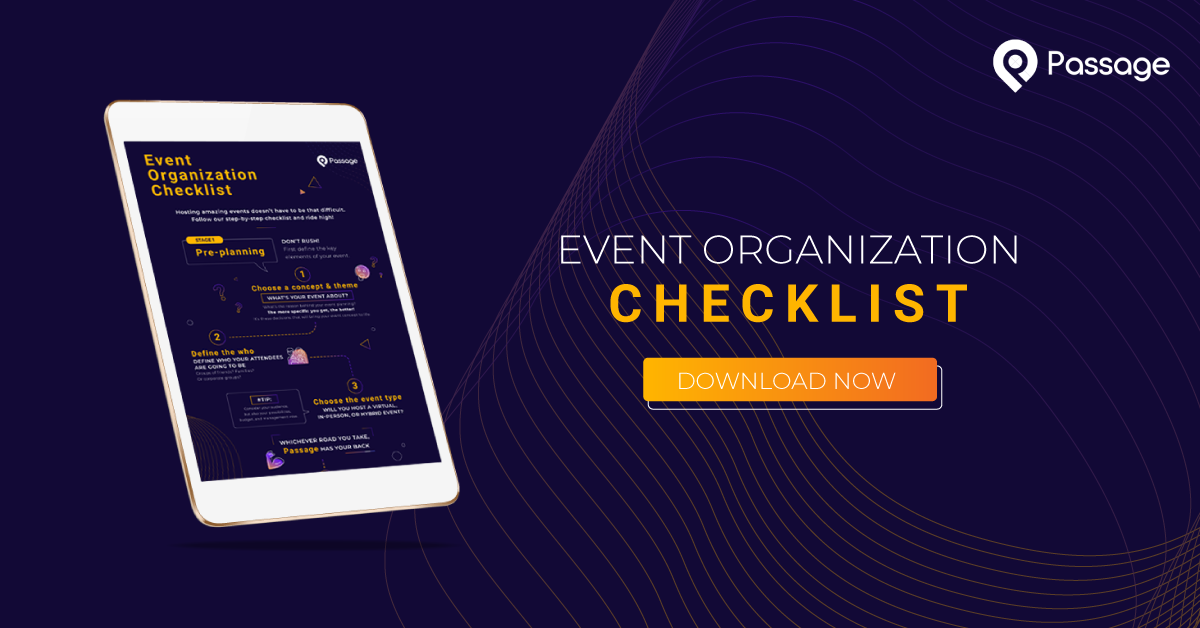If your event data falls in the wrong hands, you could be in big trouble. And your guests can be at risk too.
Every time a guest purchases a ticket to your event, they’re handing over some of their personal information. They’re trusting you to handle that information with care.
Is your event prepared to manage data security?
It’s becoming tougher and tougher to stay one step ahead of cyber crime, which went up a whopping 600% during the pandemic. Events are vulnerable to cyber attacks because you collect valuable guest information on a regular basis. Hackers want to get their hands on those details.
It’s not just outside hacks you need to worry about. Recent data breach statistics found that 63% of successful attacks come from internal sources, either control, errors, or fraud. A negligent employee or vendor is responsible for the majority of breaches.
For this reason, whether you are hosting a virtual, hybrid, or in-person event, data protection matters. Every event producer needs to know how to protect data and adopt cyber security best practices.
Why Should You Be Thinking About Data Security?
These are the main reasons why you should take the time to learn about data security practices to protect your guests’ data.
- Guest Security: If guest data is leaked, they can be subject to fraud, phishing, and even harassment or blackmail.
- Legal And Financial Matters: Privacy infringements due to mismanagement of guest data could put you at risk of a lawsuit.
- Guest Confidence: The mismanagement of guest data can also make your event lose loyal attendees and alienate future ones.
Read on to learn more on how to save yourself from these data security problems:

1. Establish A Policy
You should decide how your event will manage data security. Who gets access to guest information? What measures will you take to ensure personal information is protected?
Don't give everyone on your team access to guest information; restrict the data management to just a few team members who really need it to perform their jobs.
If you’re using a vendor who handles digital transactions (like your ticketing provider), you should also ask them about their data security policy. We’ll dig into this more below.
2. Train Your Staff
Now that you’ve established a policy, make sure your staff understands it. Train any team members who will be handling guest data so that they follow best practices. Be sure to communicate why data security is important to you and your guests - if your event staff know the reasons behind your data management policy, they’ll be less tempted to cut corners when things get busy.
You may also want to train your entire staff on basic cyber hygiene practices as well. Speaking of which…

3. Practice Good Cyber Hygiene
Keeping your guests’ information secure starts with protecting your own personal & business information. Never share passwords or send sensitive information through an unencrypted method (like email or text). Use two-factor authentication whenever possible, and use a unique password or passphrase for every account.
As an event producer, it’s easy to get busy and let a few things slide. But if you do, hackers and fraudsters will be waiting in the shadows to pounce on that opportunity. Practice good cyber hygiene daily and it will become second nature, like brushing your teeth.
4. Work with Vendors Who Prioritize Data Security
As an event producer, you can’t be expected to keep up with every new cybersecurity protocol and regulation. You just need to choose trusted vendors with a strong track record of prioritizing data security.
Any vendor who is managing your event data should be thoroughly vetted to make sure that they are following best practices. Just as your guests trust you with their information, you need to be able to trust that the vendors handling guest data are dependable as well.

5. Be Extra Careful with Payments
The payment industry has a set of security best practices known as the Payment Card Industry Data Security Standards (PCI-DSS). Ask any potential payments vendors whether they are PCI compliant and what additional measures they take to protect both your information and your guests’ data.
Passage’s ticketing platform leverages robust security practices, which we've used to process millions of transactions. We employ all of the industry-standard fraud protection techniques - from SSL secured web traffic, to address and CVV code verification, and many more. We are fully certified PCI-DSS compliant, and along with our partner payments network, Stripe.com, reach PCI-DSS Level 1 compliance status every year.
6. Redouble Your Efforts For Virtual and Hybrid Events
There has been a stunning 1000% rise in the adoption of virtual events over the past two years. These types of events are at higher risk of cyber threats and incidents because attendees are joining online through different networks around the globe.
When researching potential live stream platforms, ask each vendor the following questions:
- How do you make sure that only paid (or invited) guests are able to access my live stream?
- How do you confirm the identity of users?
- How do you prevent guests from sharing their login or access with others?
If the live streaming platform is also handing your payments, be sure to ask about their data security practices on that end, too.
Final Thoughts
Responsible data management starts with establishing a plan and practicing good cyber hygiene yourself. If you work with vendors who understand the latest industry recommendations and prioritize data security, from your ticketing provider to your webmaster. By following these best practices, you’ll be well on your way to a successful event.
When you’re ready to choose a ticketing provider, our team would be happy to answer all your questions about data security and how our ticketing platform manages guest data. Schedule a demo with one of our event experts today!











